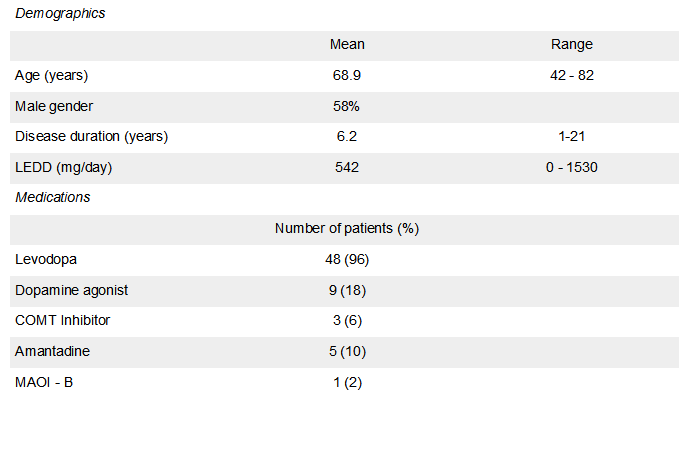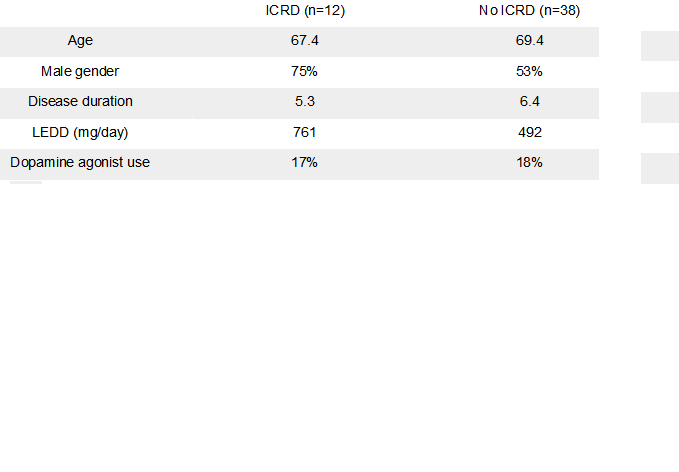Session Information
Date: Monday, June 5, 2017
Session Title: Parkinsonism, MSA, PSP (Secondary and Parkinsonism-Plus)
Session Time: 1:45pm-3:15pm
Location: Exhibit Hall C
Objective: Impulse control disorders (ICDS) are a recognised complication of dopaminergic therapy for Parkinson’s disease. We wanted to assess the rates of ICDs in New Zealand where dopamine agonist use has been very low.
Background: Impulse control and related disorders (ICRD) are a significant complication of dopaminergic therapy for Parkinson’s disease. Evidence supports that they may be under-recognised in a clinical setting. ICRD encompasses the individual impulse control disorders of pathological gambling, compulsive sexual behaviour, compulsive spending, and binge eating; and related disorders also associated with dopaminergic medication use include punding, hobbyism and dopaminergic medication overuse. These disorders have been linked to dopamine agonist use, however, government agency restrictions in New Zealand have meant low rates of use of dopamine agonists in this population.
Methods: A cross sectional sample of non-demented community with PD diagnosed by either a neurologist or geriatrician. Patients self-completed the QUIP-RS, a previously validated screening tool for impulse control disorders Clinical notes were audited. A national ethics board approved this study, and written consent was obtained from each participant.
Results: 50 patients were enrolled. The average age was 68.9 years (range 42-82). 28 were male, with an average disease duration of 6.2 years. 96% of patients were treated with levodopa. No patients were treated with dopamine agonist monotherapy. 9/50 (18%) patients were using a dopamine agonist; eight on ropinerole, one on lisuride.
24% (12/50) of patients screened positive for ICDRD using QUIP- RS. Patients who screened positive were more likely to be male (75%), younger in age and had a shorter disease duration. They had a higher average dose of dopaminergic medication, 761mg / day as opposed to 421mg / day. Of the 12, only 3 had a clinically documented suspicion of ICRD.
Conclusions: Although this is a small, non systematic cohort, rates of ICDRD seen here appear similar to others recently published, with 22% of patients screening positive. The rate of ICRD seems to be higher in males, and correlate with a higher daily levodopa dose although the sample size was too small to draw statistically significant conclusions. Only 18% of patients were on a DA. Our findings show that ICDRD should be suspected in patients regardless of DA exposure.
References: Weintraub, D., Mamikonyan, E., Papay, K., Shea, J. A., Xie, S. X., & Siderowf, A. (2012). Questionnaire for impulsive‐compulsive disorders in Parkinson’s Disease–Rating Scale. Movement Disorders, 27(2), 242-247.
To cite this abstract in AMA style:
A. Garvey, S. Buchanan, N. Cutfield. Impulse control disorders in Parkinson’s disease; description of a New Zealand cohort [abstract]. Mov Disord. 2017; 32 (suppl 2). https://www.mdsabstracts.org/abstract/impulse-control-disorders-in-parkinsons-disease-description-of-a-new-zealand-cohort/. Accessed February 24, 2026.« Back to 2017 International Congress
MDS Abstracts - https://www.mdsabstracts.org/abstract/impulse-control-disorders-in-parkinsons-disease-description-of-a-new-zealand-cohort/


